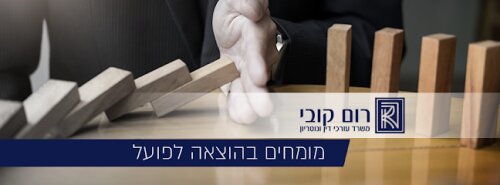Best Trusts Lawyers in Ramat Gan
Share your needs with us, get contacted by law firms.
Free. Takes 2 min.
List of the best lawyers in Ramat Gan, Israel
About Trusts Law in Ramat Gan, Israel
Trusts law in Ramat Gan, Israel, is based on principles of the Israeli Trust Law of 1979. A trust is a legal arrangement where an individual or institution, known as the trustee, holds property or assets for the benefit of another party, called the beneficiary. Trusts can be used for a variety of purposes, including estate planning, asset protection, charitable giving, and managing assets for minors or individuals unable to manage their own affairs. In Ramat Gan, like the rest of Israel, trusts can play an important role in personal and commercial legal strategies.
Why You May Need a Lawyer
There are many situations where seeking legal advice on trusts in Ramat Gan is essential. Common scenarios include establishing a trust as part of estate planning, transferring assets to heirs in a tax-efficient manner, protecting property from creditors, or setting up trusts for charitable purposes. A lawyer can help you draft legally sound trust documents, ensure compliance with Israeli law, and provide guidance on the selection of trustees and beneficiaries. Legal help can be critical if disputes arise between trustees and beneficiaries or if there are questions about managing trust assets.
Local Laws Overview
The Israeli Trust Law of 1979 is the principal legislation regulating trusts in Ramat Gan. Trusts can be private or public, revocable or irrevocable, and can include various types of property such as real estate, cash, stocks, or other assets. Registration with the Israeli Land Registry is required for real estate trusts. Trustees have legal duties to manage the trust assets responsibly, avoid conflicts of interest, and act in the best interests of the beneficiaries. Taxation of trusts is governed by Israeli tax laws, and there are specific rules depending on whether the trust is considered Israeli or foreign for tax purposes. Local regulations may include municipal taxes or fees that apply to trust holdings within Ramat Gan.
Frequently Asked Questions
What is a trust?
A trust is a legal arrangement where one party (the trustee) holds and manages assets for the benefit of another party (the beneficiary) according to specific terms set out in a trust deed or agreement.
Can anyone create a trust in Ramat Gan?
Yes, any individual or legal entity with legal capacity can create a trust, provided it complies with the relevant provisions of Israeli law.
Why would I set up a trust?
Common reasons include estate planning, protecting assets from creditors, providing for minors or disabled relatives, managing business succession, or supporting charitable causes.
What types of trusts are recognized in Israel?
Israeli law recognizes several types of trusts, including private trusts, public (charitable) trusts, revocable trusts, and irrevocable trusts, each serving different purposes.
Do I need to register a trust?
Not all trusts require registration, but trusts holding real estate must be registered with the Israeli Land Registry. Public trusts may also require registration with additional regulatory bodies.
Who can be a trustee?
Any legally competent individual or institution can serve as a trustee, unless specifically prohibited. Trustees must act in good faith and in the best interests of the beneficiaries.
How is a trust taxed in Ramat Gan?
Trusts in Israel are subject to specific tax rules, which differ depending on whether the trust is considered Israeli or foreign. Taxation can apply to trust income, gains, and sometimes distributions.
Can a trust be changed or revoked?
Whether a trust can be changed or revoked depends on its terms. Revocable trusts can be altered or canceled by the settlor, while irrevocable trusts generally cannot be changed without court intervention or consent of all parties.
What happens if there is a dispute about the trust?
If a dispute arises, it can be resolved through negotiation, mediation, or, if necessary, litigation in the relevant Israeli courts. A lawyer specializing in trusts can assist with dispute resolution.
How do I choose a trustee?
Select a trustworthy and competent individual or professional entity. The trustee should have the skills to manage the assets and understand their legal obligations under Israeli law.
Additional Resources
For further information and assistance related to trusts in Ramat Gan, consider the following resources:
- The Israel Bar Association: Provides legal information and can help you find a certified trusts lawyer. - Ministry of Justice (Trusts Registrar Office): Responsible for the registration of certain public trusts and oversight of trustees. - The Ramat Gan Municipality Legal Aid Department: Offers general legal guidance and referrals. - Certified private law firms and notaries specializing in estate and trusts law in Ramat Gan.
Next Steps
If you need legal assistance regarding a trust in Ramat Gan, the following steps are recommended:
1. Gather all relevant documents, such as property deeds, wills, existing trust documents, and identification. 2. Schedule a consultation with a qualified trusts and estates lawyer, preferably one with experience in Israeli law. 3. Prepare a list of your questions and concerns to discuss during the consultation. 4. Review and discuss your goals, whether it is creating, managing, or resolving a dispute regarding a trust. 5. Follow your lawyer’s guidance on drafting documents, fulfilling legal requirements, and ensuring proper registration if required. 6. Stay informed about your rights and obligations as a settlor, trustee, or beneficiary. Seeking professional legal advice can help you protect your assets, fulfill your intentions, and ensure that your trust is established and operated in compliance with all applicable laws in Ramat Gan, Israel.
Lawzana helps you find the best lawyers and law firms in Ramat Gan through a curated and pre-screened list of qualified legal professionals. Our platform offers rankings and detailed profiles of attorneys and law firms, allowing you to compare based on practice areas, including Trusts, experience, and client feedback.
Each profile includes a description of the firm's areas of practice, client reviews, team members and partners, year of establishment, spoken languages, office locations, contact information, social media presence, and any published articles or resources. Most firms on our platform speak English and are experienced in both local and international legal matters.
Get a quote from top-rated law firms in Ramat Gan, Israel — quickly, securely, and without unnecessary hassle.
Disclaimer:
The information provided on this page is for general informational purposes only and does not constitute legal advice. While we strive to ensure the accuracy and relevance of the content, legal information may change over time, and interpretations of the law can vary. You should always consult with a qualified legal professional for advice specific to your situation.
We disclaim all liability for actions taken or not taken based on the content of this page. If you believe any information is incorrect or outdated, please contact us, and we will review and update it where appropriate.









